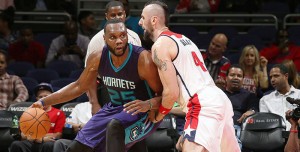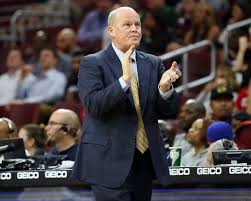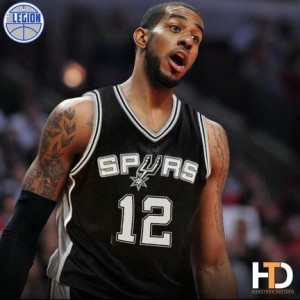 Discussing the state of the modern NBA big man in a USA Today story on Monday night, Houston Rockets center Dwight Howard said, “It’s really like we’re dinosaurs, and they’re trying to extinct us.”
Discussing the state of the modern NBA big man in a USA Today story on Monday night, Houston Rockets center Dwight Howard said, “It’s really like we’re dinosaurs, and they’re trying to extinct us.” 
Like any creature, company or concept claiming to face extinction, big men around the league should follow the wise words of Charles Darwin: adapt or die. And adapting is exactly what Charlotte center Al Jefferson did, which is one of the many reasons why the Hornets are the Eastern Conference’s hottest team over the last six weeks.
A win in Brooklyn on Tuesday was the Hornets’ 17th in their last 21 games, giving them a realistic shot at the East’s third seed. Jefferson hasn’t started a game since Nov. 29 and has played over 25 minutes just three times since. Bringing skilled big men off the bench has been a mini-trend around the league, with Oklahoma City’s Enes Kanter not starting at all this season and Miami electing to make Hassan Whiteside a reserve in late January.
The Thunder are 49-22 and well on their way to the Western Conference’s third seed, and Miami is 14-6 since Whiteside’s last start on Jan. 20. Whiteside was replaced in Erik Spoelstra’s starting five by Amar’e Stoudemire, a far less traditional big man than Whiteside, who definitely should not use Agent Block as his nickname.
In 2014-2015, Charlotte finished 28th in scoring offense and offensive efficiency, 26th in 3-pointers made and dead last in 3-point field goal percentage. So Hornets coach Steve Clifford went to Jefferson last offseason and recommended changes that would benefit both player and team going into 2015-2016.
 “And at the end of last year, we talked a lot about how the game is changing,” Clifford said. “This league is a lot more four out-one in now.”
“And at the end of last year, we talked a lot about how the game is changing,” Clifford said. “This league is a lot more four out-one in now.”
“I understood that the last two years, we established the post game,” Jefferson told SheridanHoops. “But the team we have now, which I believe why we’ve had success, is that we have so many weapons. And I think coach has done a good job mixing the new game into my old game.”
Clifford said that Jefferson has held the ball in the post less and has added a ball movement and a pick-and-roll aspect to his game to help teammates out. And it’s worked. While maintaining a top-10 defense, Charlotte is now 11th in offensive efficiency and fourth in made 3-pointers per game, according to Basketball-Reference. If you are a gambler, you can get them at 300-1 to win the title, courtesy of this great Website.
“He’s not just a post-up player anymore,” Clifford said. “That’s his strength, but when you watch him when we’re playing, we don’t play a ton differently when he’s out there than we do with Cody [Zeller].”
Asked to elaborate on Howard’s comments, Jefferson told SheridanHoops that the game has definitely changed to a more outside-oriented style since he and Howard joined the league.
“If you find a system that still believes in an inside presence, I think it will be taken advantage of [to your benefit],” Jefferson said. “When I first came into the league, every team had a post player. Now it’s very rare. Teams don’t post up as much, but when you do come across one guy or two guys that do it, I think it’ll be more beneficial.”
Now when Jefferson comes off the bench, he said, teams don’t really have reserve players who can deal with his offensive skill set.
“I think that puts more pressure on other teams,” Jefferson said. “It’s an advantage for us.”
It’s been an advantage for all three teams that were previously mentioned. Charlotte, Miami and Oklahoma City are all in the top 10 in bench plus-minus, per NBA.com, likely in part because of the matchup problems Jefferson, Whiteside and Kanter pose to opponents’ second units.
In addressing Howard’s statement, Clifford said that the best teams play to their strengths, regardless of position. So there will always be a place for big men if they are assets and strengths for their teams.
 “Look at San Antonio,” Clifford said. “You can make the argument that they’re playing two centers, and they’re on their way to being the best defensive team in the history of the NBA. And they’re third [now fourth] in offense.”
“Look at San Antonio,” Clifford said. “You can make the argument that they’re playing two centers, and they’re on their way to being the best defensive team in the history of the NBA. And they’re third [now fourth] in offense.”
As Clifford pointed out, the Spurs are bucking the current trends and are an elite team while starting big men in Tim Duncan and LaMarcus Aldridge. San Antonio uses its big men to its advantage – just like the league’s best teams do – and take the fifth-fewest threes in the league.
“You have to find a way for your team to play well,” Clifford said, still discussing how the Spurs succeed without a predominantly perimeter-oriented offense. “So I think that whenever people say, ‘you have to shoot threes,’ it makes it easier for everyone if you have range shooting because there’s more space on the floor for everybody. But look at what they’re doing. They’re doing it with size, playing two centers. If guys are good and are doing things that are making you win, then you’re going to play them.”
Teams and players are always going to adapt to the changing times, which is what we are seeing with big men such as Jefferson. And if you feature two of the best big men over the last decade like the Spurs do, or if you’re a good offensive player like Howard is, you bet your team is going to utilize whatever strengths it has.
So even though Jefferson is 31 and in his 12th NBA season, he seemingly had no problem with coming off the bench when asked.
“I’m trying to win, man,” said Jefferson, who has played in just 14 playoff games in his career. “I’ve been here for a long time and I haven’t had a lot of success as far as teams winning. So if I have the opportunity to be a part of something that has a chance to play at a level I’ve never reached before, I’m down for it.”
Channeling their inner Darwin, Jefferson, the Hornets and other teams around the league will always adapt when it comes to big men and use them in any way they think will give them a definitive edge on the court. Finding competitive advantages is a concept everyone knows will never become extinct.
Shlomo Sprung is a national columnist for SheridanHoops who focuses on analytics, profiles and features. He is also the web editor of the Brooklyn Daily Eagle. A 2011 graduate of Columbia University’s Journalism School, he has previously worked for the New York Knicks, The Sporting News, Business Insider and other publications. Follow him on Twitter.